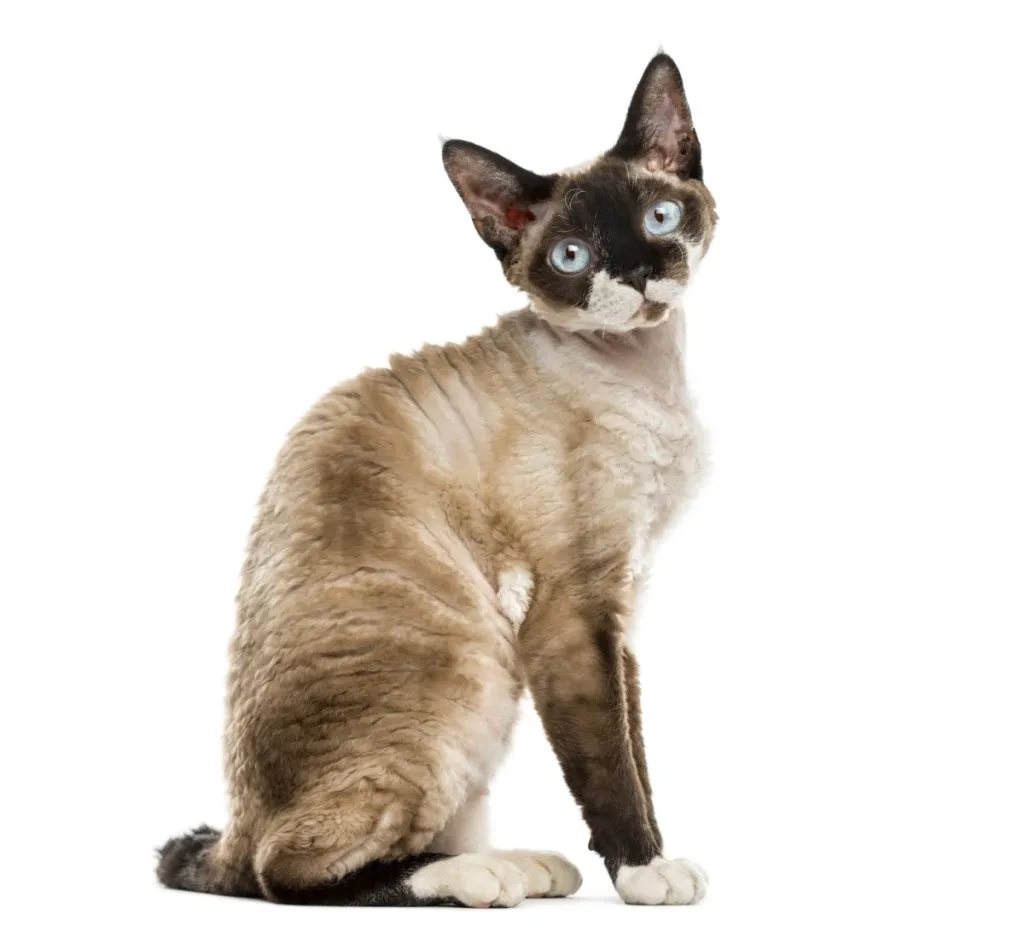The Devon Rex cat is renowned for their unique appearance and playful personality. Characterized by their large, low-set ears, short curly coat, and large, expressive eyes, the Devon Rex has a pixie-like or impish look. The soft, wavy coat is one of their most notable features, and they lack the guard hairs that most cat breeds have, giving them a soft and downy texture. The breed comes in various colors and patterns, and their slender, muscular bodies add to their overall elegant yet mischievous appearance.
Beyond their physical traits, the Devon Rex is also recognized for their friendly and affectionate nature. These cats are often described as “people-oriented” and enjoy being involved in their human family’s activities. Devons are known to form strong bonds with their owners and are often found perched on shoulders or snuggled in laps. Their playful and active nature makes them excellent companions for families, and their love of climbing and exploring provides endless entertainment. The Devon Rex is generally a healthy breed, and their low-maintenance coat makes them suitable for those who prefer a cat with minimal grooming needs.
When considering a Devon Rex, it’s advisable to prioritize adopting from rescue organizations or shelters to provide a loving home to a cat in need. However, if you decide to purchase a Devon Rex kitten, it’s crucial to choose a reputable breeder. Conduct thorough research to ensure that the breeder follows ethical practices and prioritizes the well-being of their cats. Reputable Devon Rex breeders prioritize the health and temperament of their cats. They also conduct necessary health screenings, and provide a nurturing environment for the kitties. This active approach ensures that you bring home a healthy and happy kitty while discouraging unethical breeding practices.
Quick Facts
- Origin: England. Originating in England during the 1950s, the Devon Rex breed was the result of a natural mutation. A stray kitten named Kirlee, with a curly coat, was discovered in Devon, England.
- Size: Medium
- Breed group: Natural
- Lifespan: 9-15 years
- Coat: Short, curly, and soft
- Temperament: Intelligent, playful, affectionate, and mischievous. Devon Rex cats have a reputation for being affectionate and forming strong bonds with their human companions. They thrive on attention and love to be a part of their family’s daily activities. Their sociable nature extends to other pets as well, as they often get along well with dogs and other cats.
- Exercise needs: Moderate
- Training: Trainable
- Grooming: Low-maintenance. In terms of grooming, the Devon Rex requires regular but minimal care. Their curly coat is prone to oiliness, so occasional baths may be necessary to keep them clean and healthy. Additionally, their large ears should be checked regularly for cleanliness to prevent any potential issues.
- Health: Generally healthy, but prone to certain health conditions, such as hypertrophic cardiomyopathy (HCM) and hip dysplasia.
- There are two Devon Rex cats in the 2019 film “Lady and the Tramp,” appropriately named Devon and Rex.
- Dita Von Teese had a beloved Devon Rex named Aleister Von Teese.
Devon Rex Pictures
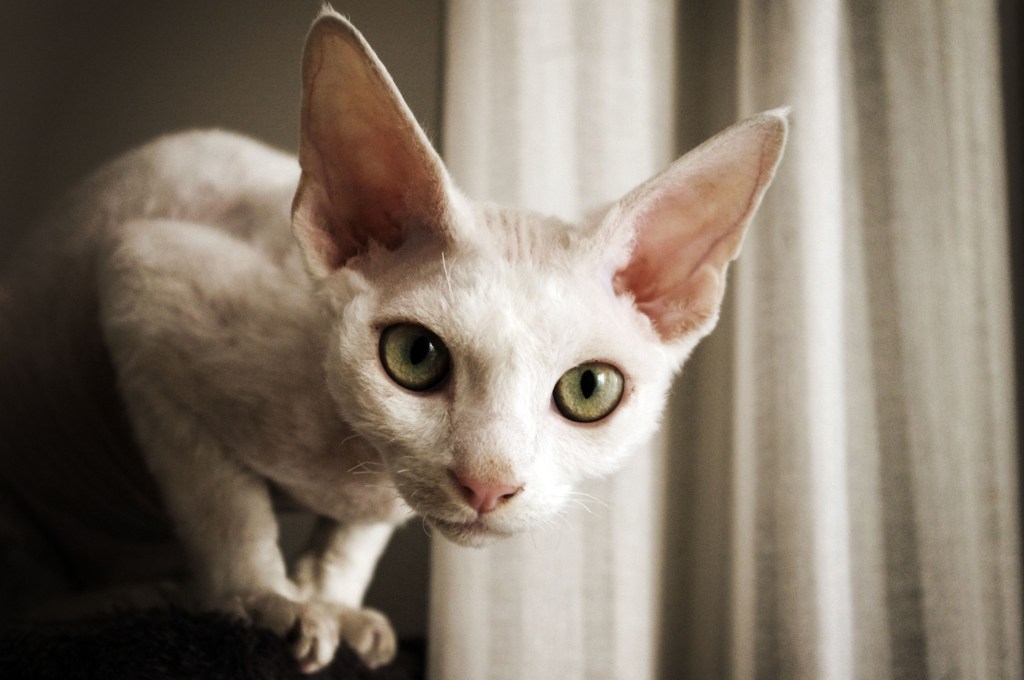
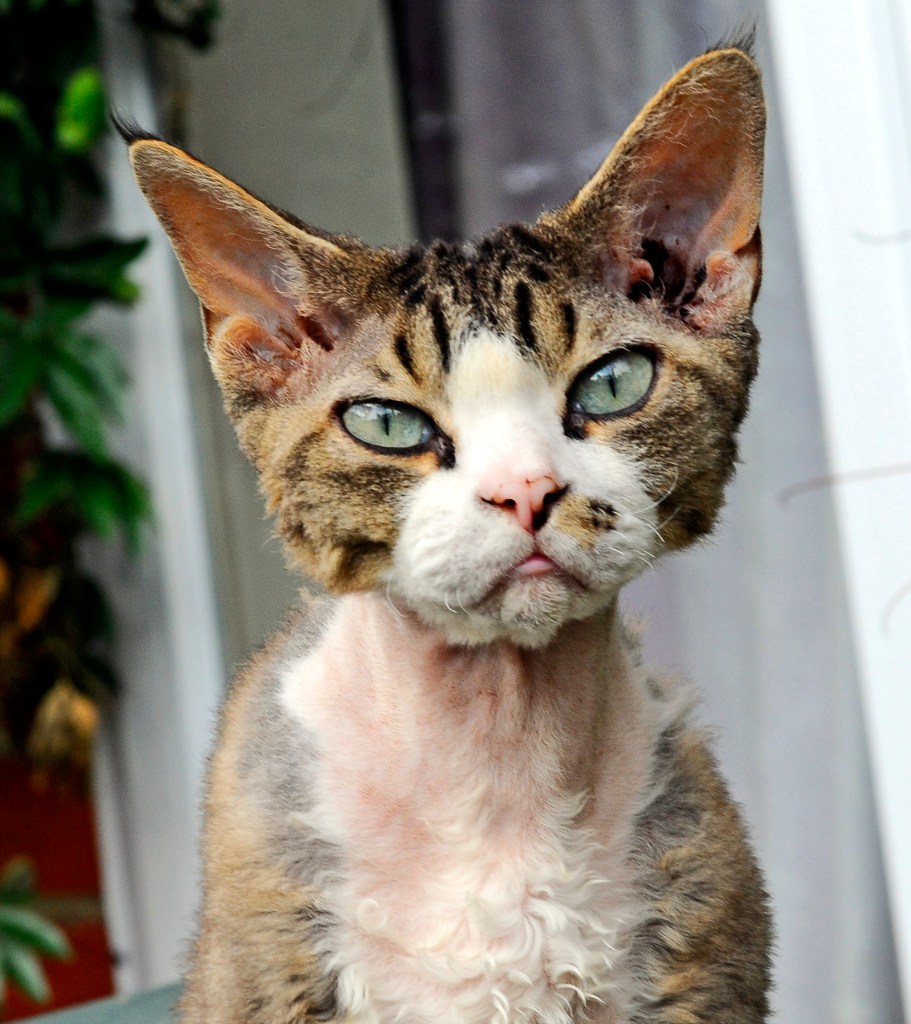
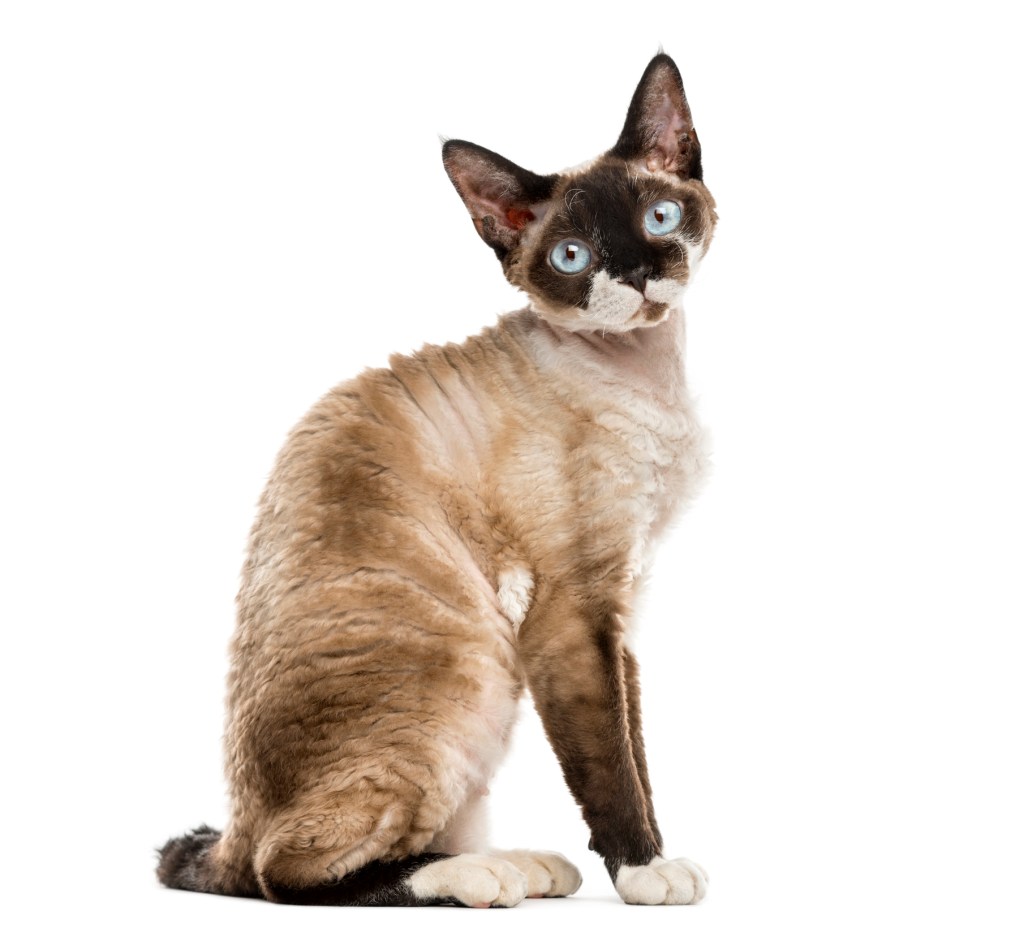
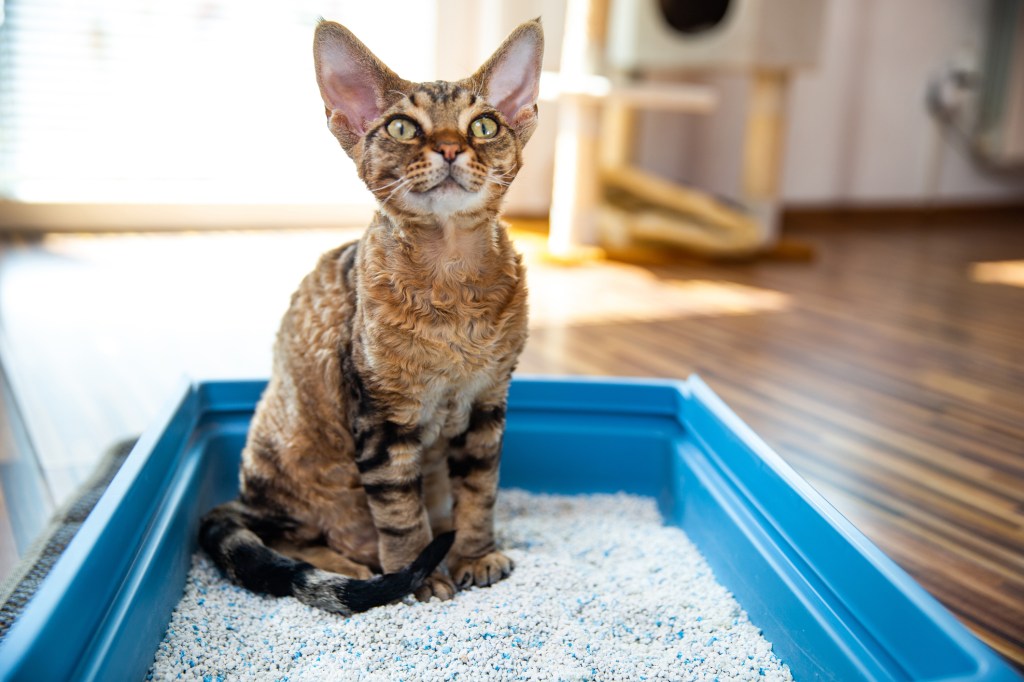
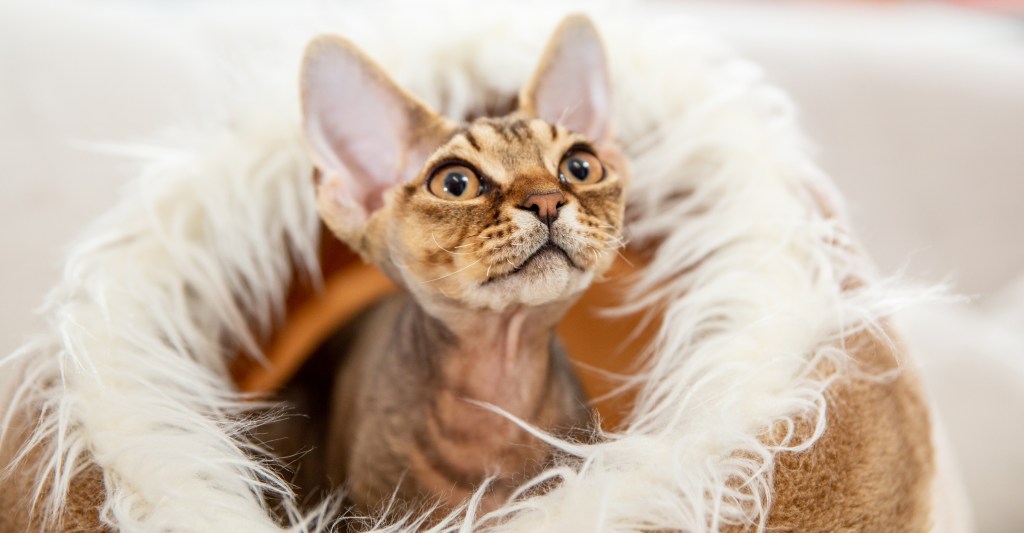
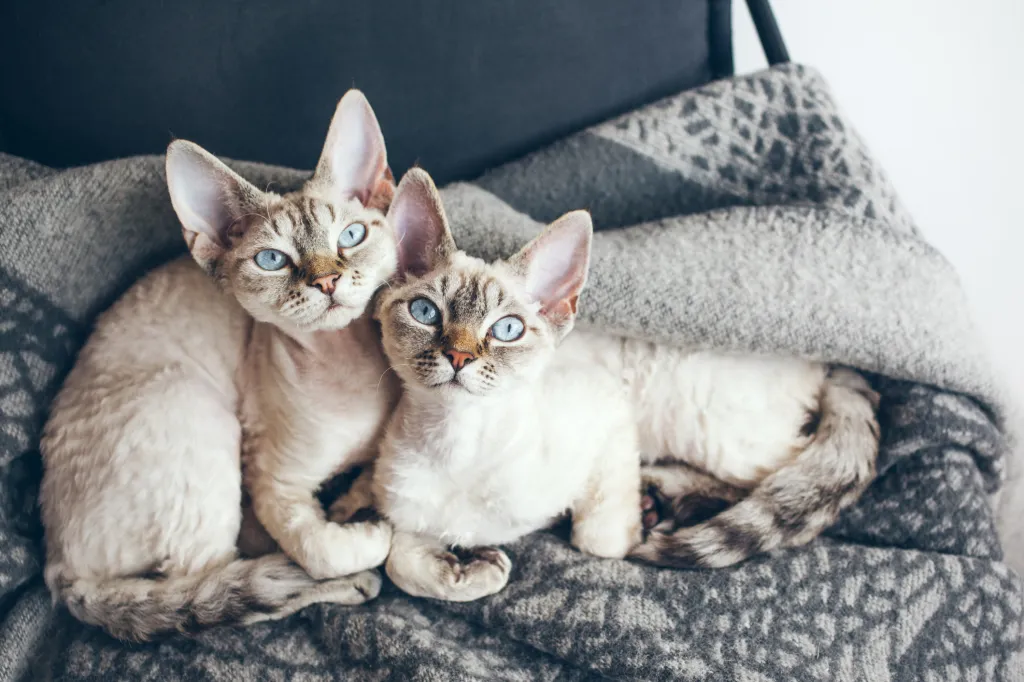
-
Affectionate with Family
Some cat breeds are typically independent and aloof, even if they’ve been raised by the same person since kittenhood; others bond closely to one person and are indifferent to everyone else; and some shower the whole family with affection. Breed isn’t the only factor that goes into affection levels; cats who were raised inside a home with people around feel more comfortable with humans and bond more easily.

See Cats Less Affectionate with Family -
Amount of Shedding
If you’re going to share your home with a cat, you’ll need to deal with some level of cat hair on your clothes and in your house. However, shedding does vary among the breeds. If you’re a neatnik, you’ll need to either pick a low-shedding breed or relax your standards. This furniture cover can make it easier to clean up cat hair and keep it off your sofa!
-
General Health
Due to poor breeding practices, some breeds are prone to certain genetic health problems. This doesn’t mean that every cat of that breed will develop those diseases; it just means that they’re at an increased risk. If you’re looking only for purebred cats or kittens, it’s a good idea to find out which genetic illnesses are common to the breed you’re interested in.
-
Potential for Playfulness
Some cats are perpetual kittens—full of energy and mischief—while others are more serious and sedate. Although a playful kitten sounds endearing, consider how many games of chase the mouse-toy you want to play each day, and whether you have kids or other animals who can stand in as playmates. A classic wand cat toy like this one is perfect for playful felines!
-
Tendency to Vocalize
Some breeds sound off more often than others with meows, yowls, and chattering. When choosing a breed, think about how the cat vocalizes and how often. If constant “conversation” drives you crazy, consider a kitty less likely to chat.
-
Kid-Friendly
Being tolerant of children, sturdy enough to handle the heavy-handed pets and hugs they can dish out, and having a nonchalant attitude toward running, screaming youngsters are all traits that make a kid-friendly cat. Our ratings are generalizations, and they’re not a guarantee of how any breed or individual cat will behave; cats from any breed can be good with children based on their past experiences and personality.
-
Friendly Toward Strangers
Stranger-friendly cats will greet guests with a curious glance or a playful approach; others are shy or indifferent, perhaps even hiding under furniture or skedaddling to another room. However, no matter what the breed, a cat who was exposed to lots of different types, ages, sizes, and shapes of people as a kitten will respond better to strangers as an adult.
-
Easy to Groom
Some breeds require very little in the way of grooming; others require regular brushing to stay clean and healthy. Consider whether you have the time and patience for a cat who needs daily brushing. You should definitely pick up this awesome de-shedding tool for cats of any hair length!
-
Intelligence
Some cat breeds are reputed to be smarter than others. But all cats, if deprived the mental stimulation they need, will make their own busy work. Interactive cat toys are a good way to give a cat a brain workout and keep them out of mischief. This scratcher cat toy can keep your smart kitty busy even when you’re not home!
-
Pet Friendly
Friendliness toward other household animals and friendliness toward humans are two completely different things. Some cats are more likely than others to be accepting of other pets in the home.
Devon Rex History
It was first thought that Kirlee, a kitten born in Devon, England, in 1959, shared the same genetic makeup as the Cornish Rex, a breed born a decade earlier in nearby Cornwall, but test breedings soon established that Kirlee was unique, another result of a natural genetic mutation.
As suggested by his name, Kirlee had a wavy coat. Little is known of his ancestry. His mother was a stray, and his father was thought to be a roaming tom who also had a curly coat. Kirlee became the progenitor of a new breed, the Devon Rex, named for his birthplace of Devonshire, as well as his curly coat, which had a texture reminiscent of that of a rex rabbit. Less than a decade later, in 1968, a Devon Rex had emigrated to the United States. The Cat Fanciers Association gave the breed full recognition in 1979.
Devon Rex Size
The Devon Rex weigh 5 to 10 pounds.
Devon Rex Personality
The Devon’s favorite perch is right at head level, on the shoulder of his favorite person. He takes a lively interest in everything that is going on and refuses to be left out of any activity. Count on him to stay as close to you as possible, occasionally communicating his opinions in a quiet voice. He loves people and welcomes the attentions of friends and family alike.
This is a smart cat with a moderate activity level. He’s not in constant motion, but he does like to learn tricks and play fetch. Puzzle toys and interactive toys are a delight to his inventive brain and will help to keep him occupied while you are out earning money to buy more of them.
At mealtime, the Devon will try to seat himself at the dining room table with the rest of the family, sure that the food you have prepared is just for him. He likes to eat and will snack himself into a few extra pounds if you don’t carefully monitor his food intake.
Under the covers is his preferred place to sleep. Like a heat-seeking missile, he targets the warmest spots he can find.
Choose a Devon if you will enjoy the company of a mischievous, agile cat and won’t be alarmed to see him peering down at you from the top of a door, plotting the trajectory to your shoulder.
Devon Rex Health
Both pedigreed cats and mixed-breed cats have varying incidences of health problems that may be genetic in nature. Devon Rex are generally healthy, but the following diseases have been seen in the breed:
- Congenital Hypotrichosis: Otherwise known as hereditary baldness, Congenital Hypotrichosis is a condition that is probably the result of an inherited recessive gene. The Devon Rex naturally has a very fine coat, but those with less hair than normal for the breed are considered to be hypotricotic.
- Hypertrophic Cardiomyopathy: This is a form of heart disease that is inherited in some cat breeds such as the Maine Coon. Heritability has not been proven in the Devon Rex.
- Malassezia Dermatitis: This is a single-celled yeast that causes ear infections, greasy skin and itchiness, which is treated with antifungal drugs.
- Hip Dysplasia: A malformation of the hip socket that causes laxity of the hip joint.
- Urticaria Pigmentosa: A dermatological problem that causes crusty sores on the body and is treated with prednisolone and essential fatty acids.
- Devon Rex Myopathy: Also known as spasticity, this is an inherited condition that becomes apparent between 3 weeks and 6 months of age. It causes generalized muscle weakness, and the cats tire easily. No treatment is available, and severity of the condition varies. It may remain stable or progress slowly.
Devon Rex Care
The Devon’s wavy coat is easy to maintain. Groom gently so you don’t break the delicate hairs. In many cases, brushing your hand over the coat is all it needs. The best thing about a Devon Rex coat is that it doesn’t shed much, and the fur is so fine that it isn’t very noticeable on clothing and furniture.
Baths are rarely necessary unless the cat is white or has a lot of white on the coat. Those cats can start to look dingy if they are not regularly bathed. The coat dries quickly after a bath. Brush the teeth to prevent periodontal disease. Daily dental hygiene is best, but weekly brushing is better than nothing. Wipe the corners of the eyes daily with a soft, damp cloth to remove any discharge. Use a separate area of the cloth for each eye so you don’t run the risk of spreading any infection.
Check the ears weekly. If they look dirty, wipe them out with a cotton ball or soft damp cloth moistened with a 50-50 mixture of cider vinegar and warm water. Avoid using cotton swabs, which can damage the interior of the ear.
Keep the litter box spotlessly clean. Like all cats, Devon Rex are very particular about bathroom hygiene. The Devon Rex feels warm to the touch, but he is always seeking warmth. If you are cold, he probably is too. Buy him a nice sweater or two to help him retain heat. It’s a good idea to keep a Devon Rex as an indoor-only cat to protect him from diseases spread by other cats, attacks by dogs or coyotes, and the other dangers that face cats who go outdoors, such as being hit by a car.
Devon Rex who go outdoors also run the risk of being stolen by someone who would like to have such an unusual cat without paying for it. If possible, build your Devon Rex a large outdoor enclosure where he can jump and climb safely. If your Devon Rex has an outdoor enclosure that allows for sunbathing, be sure to apply cat-safe sunscreen to his body to prevent sunburn.
Devon Rex Coat Color And Grooming
The Devon is often described as having an elfin appearance, with his large ears, high cheekbones and striking eyes. His outstanding characteristic, however, is his soft, wavy fur. His curvy body starts with his head, a modified wedge shape with convex curves forming the outer edge of the ear lobes, the cheekbones and the whisker pads.
The Devon has large, wide-set, oval-shaped eyes and strikingly large ears set low on the head. Sometimes the tips of the ears are tufted with fine fur. A “rexed” coat is soft and fine, appearing to be without the harsh guard hairs that characterize most cat coats. The cat’s body is well covered with fur, most thickly on the back, sides, tail, legs, face and ears. Some Devons have loose, shaggy curls, while others have a coat that is more thin and suedelike. The hair on the top of the head, the neck, chest and abdomen is slightly less dense and may even look downy, but the cat should never have bare patches. Smooth the coat with your hand and rippled waves appear.
It comes in any genetically possible color, pattern or combination of colors and patterns, including solid white, black, blue, chocolate, cinnamon, lavender and red; smoke patterns, which are a white undercoat deeply tipped with a specific color; and various calico, tabby, tortoiseshell and pointed patterns. A Devon’s medium-size body is deceptively slender, unless the cat has been sneaking too many snacks. His body should feel hard and muscular. The legs are long and slim, supported by small, oval paws. A long, fine tail covered with short fur tapers at the end.
Children And Other Pets
The active and social Devon Rex is a perfect choice for families with children and cat-friendly dogs. He will play fetch as well as any retriever, learns tricks easily and loves the attention he receives from children who treat him politely and with respect. Introduce pets slowly and in controlled circumstances to ensure that they learn to get along together.
Devon Rex Rescue Groups
More Info For You
If you’re also looking for a dog, check out DogTime’s dog breed pages!
